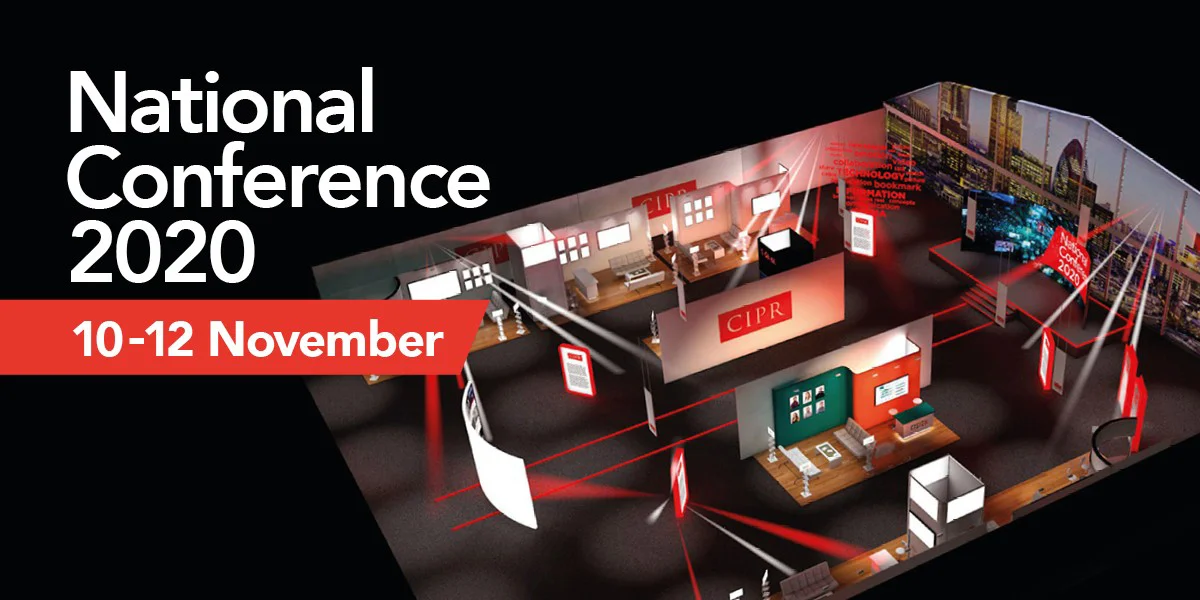I (virtually) attended Day 1 of the CIPR National Conference 2020 with a theme of ‘What is this new world?‘. A question that we have all been asking ourselves this year! The day was packed with some fantastic speakers and great insight. Here’s my recap:
“If you change the context, you change the perception; if you change the perception, you change the emotion; if you change the emotion, you change the behaviour.” Rory Sutherland, Vice Chairman at Ogilvy UK, never fails to disappoint. When a conference kicks off with that gripping and, quite frankly, intriguing statement from a gentleman who is now a Global TED speaker, you could be forgiven for suggesting that it’ll be hard to follow that up. However, the Chartered Institute of Public Relations (CIPR) National Conference lived up to its usual high standards, despite shifting to a virtual conference this year.

What is this new world?
This subject was approached by Will Moy, chief executive of Full Fact, the UK’s independent fact checking charity. With elections, pandemics and referendums aplenty, concerns about fake news, particularly on social media platforms, have been rife. However, Will did raise a valid point about sharing critical data in our comms activities. “The idea of communicating facts in a desiccated way, shorn of any context and meaning for people’s lives is a complete nonsense. The job is to make real, trustworthy information useful to people,” he said.
He also provided five suggestions that PR pros need to consider about the new media landscape:
- basics matter
- good information is critical
- invest in monitoring
- be prepared to respond to bad or false information
- “nothing actually really matters very much”
PR in politics
Chris Wilkins, former speechwriter to Theresa May, shone some interesting light on what goes on behind the scenes in the political arena. Chris, who was at the very first luncheon at the White House after Donald Trump was sworn in as President, reinforced the importance of mobilising the power of emotion because “we’ve seen a shift in the way politician governments need to communicate. The winners will be those who know how to feed and wield it effectively”.

Individuals and organisations have experienced change in immeasurable ways in 2020. This was addressed by Graeme Codrington, futurist and researcher, who warned that “we may be done with deep disruptive change, but disruption is not done with us”. He highlighted the need for organisations and individuals to build skillsets which allow us to adapt to future and inevitable challenges. He added that it is time for us all to re-imagine our mindset as we prepare for a new future and that disruption is key to our thinking and planning for 2021, but we need to realise that even more disruptors are coming our way such as AI, automation, robotics, cloud, mobility, machine learning, data and predictive analytics.
The future of the workplace
With millions of people continuing to work from home, Philip Ross, founder and CEO at Unwork, made it clear that the workplace of the future has to place experience at the heart of the offering – “thinking about what you want to do in your office environment will be critical for your brand,” he said.

In among the madness of this (ok, I’ll say it) unprecedented year, was a quote from Chris Wilkins which particularly resonated: “After years of government insurgencies fuelled by emotional appeals, will the pandemic actually shift us all back to a calmer, more pragmatic view of politics and government? I wonder if the pandemic might actually accelerate and progress everything to be a bit calmer so it will be a bit more like it used to be before the turmoil of recent years. Rather than a new normal, I suspect people will make do with some of the old normal.”
We can all only hope.









